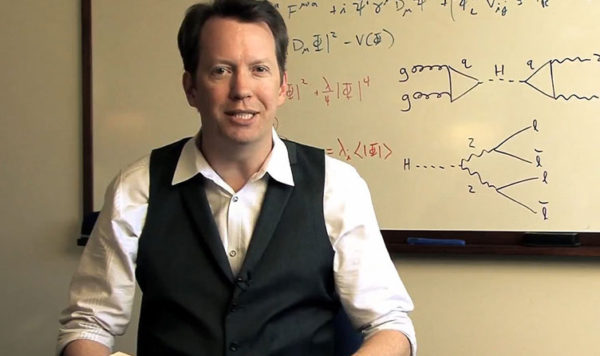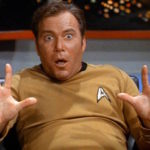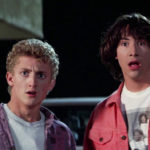Is Sean Carroll Correct That the Universe Moves By Itself?
by Brandon Vogt
Filed under Atheism, Christianity and Science, Cosmology

Many theists, including myself, believe that some of the strongest arguments for God rely on the logical need for a First Cause of the universe (or First Mover, depending on which argument you use.) This sort of argument goes back at least to Aristotle, who thousands of years ago suggested that, "Everything that is in motion must be moved by something" (and by motion he meant any change whatsoever, not just locomotion, or spatial change).
However, physicist Sean Carroll thinks Aristotle had it wrong. In one of the earliest chapters in his new book, The Big Picture: On the Origins of Life, Meaning, and the Universe Itself (Dutton, 2016), Carroll explains why. His reason? "The whole structure of Aristotle's argument for an unmoved mover rests on his idea that motions require causes. Once we know about conservation of momentum, that ideas loses steam" (28).
To put it another way, Carroll believes that the conservation of momentum debunks the idea of causality, the principle that all actions are determined by causes.
Carroll admits that it does seem to us, in our everyday experience, that things don't "just happen"—something works to cause them, to bring them about. But he still believes causal language is "no longer part of our best fundamental ontology" (29). Poetic naturalists can speak of causality as an emergent, second-level description of reality, but it's not a level-one story we should tell about the world (i.e., it's not a description of how the world really works at its core.)
Now, one obvious question that Carroll's position raises is, how exactly does the conservation of momentum disprove causality? Carroll never offers a clear answer. He suggests that objects on frictionless surfaces moving at constant velocity do not need a cause to keep moving (28).
But of course, this doesn't refute the Aristotelian principle of causality. At best, this would only show that in such cases, you don't need a sustaining cause to keep an object moving. It would say nothing about whether you need an initial cause to start the object's motion.
To use another example, you could say that in general, once a baby boy grows to age 21, he generally doesn't need his father to "stay in motion," and continue developing. Whether his father is alive or dead, distant or close, he can survive just as well (again, generally speaking.) But this fact doesn't show that the father was completely unnecessary in the child's life. For if there was no father, there would be no baby boy—and certainly no 21-year-old man! Thus the father was necessary to explain how the baby boy "started going," but not necessary to explain how he "kept going."
Similarly, Aristotle would agree that everything in that begins to move must be initially moved by something, regardless of whether it continues requiring a cause or not. Even in the hypothetical case of a cup sailing along a frictionless table, you still need to explain what caused the cup to move in the first place. It can't have been in motion forever without cause, at least within the real world, for various reasons (none of which Carroll acknowledges or engages.)
So Carroll's attempt to refute the principle of causality, and thus the universe's need for a First Cause, fails because he doesn't distinguish between different types of causality, such as initial or sustaining causes. He in essence suggests that since things in motion may not require sustaining causes, then they don't need any causal explanations.
(For a helpful background on the critical distinction between different forms of causality, read Dr. Edward Feser's book, Aquinas.)
Carroll makes a similar mistake when he concludes, "The universe doesn't need a push; it can just keep going!" (28). The problem is that, once again, this mixes up two different forms of causality. The first part of his claim concerns how or whether the universe began, whether it had an initial cause to "push" it into existence. The second part concerns how the universe continues existing after it comes into existence, whether or not it has a sustaining cause to "keep [it] going." The two questions are not identical.
Regardless, Carroll offers no convincing reasons to accept either idea, that the universe "doesn't need a push" or that it can "just keep going" without any sustaining cause.
Interestingly, Carroll doesn't think we should get rid of causal language. He writes (emphasis mine):
"It's possible to understand why it's so useful to refer to causes and effects in our everyday experience, even if they're not present in the underlying equations. There are many different useful stories we have to tell about reality to get along in the world." (29)
Note here, again, his concern over whether causal language is useful, not whether it's true. On his view, poetic naturalists can tell whatever stories they want about the world as long as they're useful—as long as they help us "to get along in the world."
But this recalls my major critique of poetic naturalism: it's fine with embracing false accounts of the world so long as they're useful. It cares more about pragmatism than truth.
In the end, this chapter doesn't so much refute causality as it exposes Carroll's internal conflict. He wants to reconcile two contradictory positions, first that causality is fundamentally an illusion, and second that we can't "get along in the world" (nor, I would argue, carry on the work of science) without taking causal language for granted.
Carroll says we should embrace causality because it's useful.
I say we should embrace it because it true.
Either way, whether it's only useful or both useful and true, Carroll gives no reason to oppose theists who use causal language. After all, if such language is useful, then certainly theists can use it in arguments for God!
In the next post, we'll look at another central idea in Carroll's book, determinism.
(Editors Note: Dr. Edward Feser has a post here at Strange Notions digging further into Carroll's views on causality. Read it here.)
Related Posts
Note: Our goal is to cultivate serious and respectful dialogue. While it's OK to disagree—even encouraged!—any snarky, offensive, or off-topic comments will be deleted. Before commenting please read the Commenting Rules and Tips. If you're having trouble commenting, read the Commenting Instructions.












